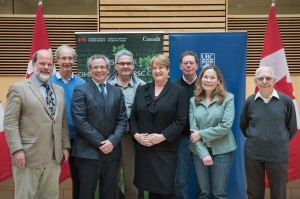 New funding for major program to tackle microbial drug resistance
New funding for major program to tackle microbial drug resistance
Natalie Strynadka has joined with colleagues at UBC, at other Canadian Universities and several centres in Europe to attract major new funding for a Joint Initiative of the Canadian Government (through CIHR) and the European Union. Natalie has won two grants that are valued at over $1 Million over three-year term of the award. One of these grants is to develop new approaches to inhibit peptidoglycan cross-linking as a target for antibacterial drug development, and the other to find ways of protecting the effectiveness of beta-lactam antibiotics (a class of antibiotics that includes penicillin) by finding and developing molecules to prevent their inactivation.
Natalie’s two awards are among six grants from the Canadian Institutes of Health Research that are aimed at developing new approaches to antimicrobial resistance. Her work will focus on producing high resolution structures of key proteins and protein complexes to determine the critical molecular mechanisms by which pathogenic bacteria function, infect their hosts, and resist current antibiotics. It is hoped that this work will enable the design of new drugs to overcome drug resistance.
Charles Thompson, a Professor in the Department of Microbiology and Immunology, will receive a $600,000 grant to develop a new strategy for treating drug-resistant tuberculosis using a multiple target approach. Julian Davies, Professor Emeritus in Microbiology and Immunology, and Raymond Andersen, a Professor in the Department of Chemistry, will be collaborating on a project led by McMaster University that received $1.5 million. Horacio Bach, an Adjunct Professor in the Division of Infectious Disease (Department of Medicine), is co-recipient of a $298,000 grant with Urs Hafeli, an Associate Professor in the Faculty of Pharmaceutical Sciences. They will investigate the mechanism of eradicating multi-drug resistant bacteria using organic and inorganic compounds and protein nanoparticles.
The grants were announced on April 13 at UBC by Cathy McLeod, Parliamentary Secretary to the Minister of Health, who explained that the funds are part of Canada’s contribution to a 19-country consortium on antimicrobial resistance. “Innovation is one of the key components of the Government of Canada’s framework for addressing the global health issue of antimicrobial resistance,” McLeod said. “Today’s announcement shows how Canadian researchers are contributing at the international level. Their work will benefit Canadians and people around the world.” “Canadian researchers are at the leading edge of the science of antimicrobial resistance and antibiotic drug development,” said Marc Ouellette, Scientific Director, CIHR Institute of Infection and Immunity. “CIHR is proud to support their work and their participation in international collaborations focused on producing innovative solutions to this global challenge.”
From left to right: Dr. John Hepburn, Dr. Charles Thompson, Dr. Marc Ouellette, Dr. Horatio Bach, PS McLeod, Dr. Raymond Andersen,
Dr. Natalie Strynadka, Dr. Julian Davies.
Photo credit Martin Dee/UBC
